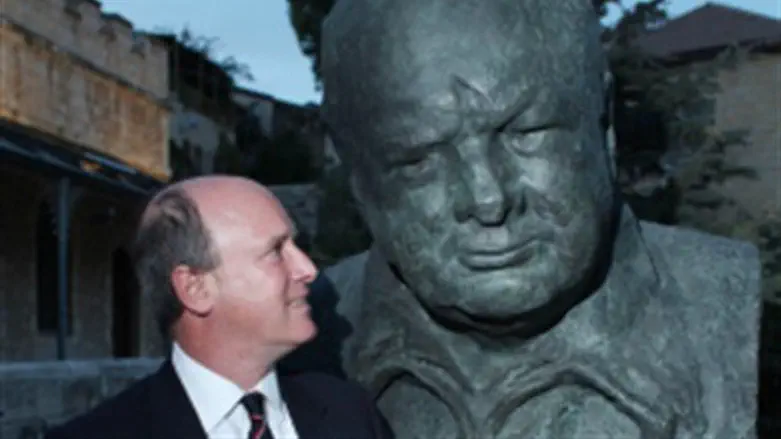
Almost half a century after his death, Winston Churchill was honored in Jerusalem on Sunday with a statue and tribute proclaiming him a friend of the Jewish people and supporter of Zionist aspirations.
A large bronze bust, constructed by renowned sculptor Oscar Nemon, was unveiled at Mishkenot Sha'ananim, outside of the Old City walls, in recognition of the wartime British leader, who remains arguably one of the most outstanding historical personalities.
The ceremony was attended by the former prime minister's great grandson, Randolph Churchill, as well as Israeli and British diplomats and politicians.
While many argue that Churchill's failure to bomb the Nazi death camp at Auschwitz outweighed his support for the Jewish people, he is widely regarded as a friend of the Jewish nation and the state of Israel.
British Ambassador Matthew Gould said that it was “absolutely right” that Churchill be honored in Jerusalem.
“He stood up for the rights of the Jewish people to a Jewish homeland long before it became fashionable – if it was ever fashionable,” said Gould.
Speaking at the ceremony, Mayor of Jerusalem Nir Barkat quoted Churchill as saying, "If you have enemies, good, it means that you have stood up for something in your life".
The unveiling of the statue comes shortly after Churchill’s official biographer, Sir Martin Gilbert, published Churchill and the Jews: A Lifelong Friendship.
“For more than half a century Churchill’s life intertwined with Jewish issues,” Gilbert writes in the book’s preface. “As a young Member of Parliament from 1904 to 1908 with many Jews among his constituents; as a Cabinet minister in 1921 and 10922 responsible for determining the future status of the Jewish National Home in Palestine; as a war leader from 1940 to 1945 confronted by the military power and tyranny of Nazi Germany; as a peacetime Prime Minister from 1952 to 1956, in the early days of the State of Israel, he was aware of Jewish concerns and sympathetic to them. Although such a sympathetic stance was unpopular with many colleagues, parliamentarians an contemporaries, Churchill rejected what he called ‘the anti-Semitic lines of prejudice’, and strove to support Jewish national aspirations, both as citizens of Britain participating fully in national life, and as advocates and participants in the creation of Israel."
“For his support of Zionist enterprise in Palestine, Churchill was warned publicly by one Member of Parliament that as a result of his efforts he would find himself ‘up against the hereditary antipathy which exists all over the world to the Jewish race.’ Churchill was not deterred,” writes Gilbert. “While never an uncritical supporter of Zionism, he was one of its most persistent friends and advocates. In a world where Jews were often the objects of scorn, dislike, distrust and hostility, Churchill held them in high esteem, and wanted them to have their rightful place in the world.”
Gilbert goes on to explain that at a time when Churchill was criticizing the Jewish underground in Palestine prior to the establishment of the state of Israel, he told a Jewish friend who was uneasy about his criticisms: “The Jewish people know well enough that I am their friend."
“This was true: he was both a friend in their hours of need, and a friend in deed,” writes Gilbert in the conclusion of the book’s preface.